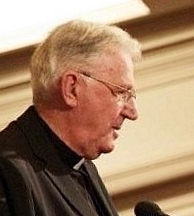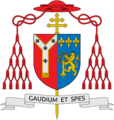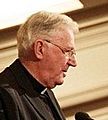Cormac Murphy-O'Connor facts for kids
Quick facts for kids His Eminence Cormac Murphy-O'Connor |
|
|---|---|
| Cardinal Archbishop of Westminster Primate of England and Wales |
|
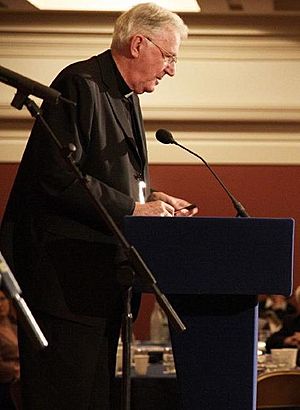
Cormac Murphy-O'Connor speaking at a one-day National Poverty Hearing in Central Hall Westminster on 6 December 2006
|
|
| See | Westminster |
| Appointed | 15 February 2000 |
| Enthroned | 22 March 2000 |
| Reign ended | 3 April 2009 |
| Predecessor | Basil Hume |
| Successor | Vincent Nichols |
| Other posts | Cardinal-Priest of S. Maria sopra Minerva |
| Orders | |
| Ordination | 28 October 1956 |
| Consecration | 21 December 1977 by Michael Bowen |
| Created Cardinal | 21 February 2001 |
| Rank | Cardinal-Priest |
| Personal details | |
| Birth name | Cormac Murphy-O'Connor |
| Born | 24 August 1932 Reading, Berkshire, England, United Kingdom |
| Died | 1 September 2017 (aged 85) Westminster, London, England, United Kingdom |
| Buried | Westminster Cathedral |
| Denomination | Roman Catholic |
| Previous post |
|
| Motto | Gaudium et Spes |
| Coat of arms |  |
Cormac Murphy-O'Connor (born 24 August 1932 – died 1 September 2017) was an important leader in the Catholic Church in Britain. He was a cardinal and served as the Archbishop of Westminster. This made him the head of the Catholic Church in England and Wales.
Pope John Paul II made him a cardinal in 2001. He retired as archbishop in 2009 when he was 75 years old. Pope Benedict XVI accepted his retirement.
Contents
Early Life and Education
Cormac Murphy-O'Connor was born in Reading, England, on 24 August 1932. He was the fifth son in his family. His parents, George and Ellen, came from County Cork in Ireland.
His family had a tradition of men becoming doctors or priests. Several of his relatives, including two brothers, also became priests or joined religious orders. His cousin, Jerome Murphy-O'Connor, was a famous expert on the New Testament.
Cormac went to Presentation College and Prior Park College. In 1950, he went to the Venerable English College in Rome. There, he studied to become a priest. He earned degrees in philosophy and theology. He became a priest on 28 October 1956. For the next ten years, he worked in churches in Portsmouth and Fareham.
Church Career
Early Roles in the Church
In 1966, Murphy-O'Connor became the private secretary to Bishop Derek Worlock in Portsmouth. In 1970, he became a parish priest in Portswood, Southampton.
Soon after, in 1971, he was chosen to be the rector of the Venerable English College in Rome. This was the same college where he had studied. While he was rector, he welcomed the Anglican Archbishop of Canterbury, Donald Coggan, on a special visit to Pope Paul VI in 1977. This visit was important for building bridges between different Christian churches.
Becoming a Bishop
On 17 November 1977, Cormac Murphy-O'Connor was named Bishop of Arundel and Brighton. He officially became a bishop on 21 December 1977.
He played a key role in bringing different Christian churches closer together. From 1982 to 2000, he helped lead the Anglican–Roman Catholic International Commission. This group worked to improve understanding between the Anglican and Catholic Churches. In 2000, he received a special award from the Archbishop of Canterbury for his work towards Christian unity.
Archbishop and Cardinal
| Styles of Cormac Murphy-O'Connor |
|
|---|---|
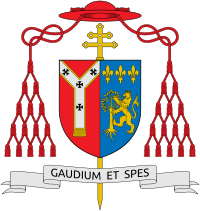 |
|
| Reference style | His Eminence |
| Spoken style | Your Eminence or My Lord Cardinal |
| Informal style | Cardinal |
| See | Westminster (emeritus) |
On 15 February 2000, Murphy-O'Connor was appointed the tenth Archbishop of Westminster. This made him the leader of the Catholic Church in England and Wales. In November of that year, he was also chosen to be the President of the Catholic Bishops' Conference of England and Wales.
On 21 February 2001, Pope John Paul II made him a Cardinal-Priest. This is a very high rank in the Catholic Church.
As a cardinal, he served on several important committees in the Roman Curia. These committees help the Pope manage the Church worldwide. He also worked on a commission that helped translate church texts from Latin into English.
In August 2001, he was given the special title of Freeman of the City of London.
In January 2002, he gave a sermon at an Anglican service at Sandringham. This was a historic moment, as it was the first time a Catholic leader had preached to an English monarch since 1680. Later that year, he was also the first cardinal since 1509 to read prayers at a Royal Funeral Service in Westminster Abbey. This was for the Queen Mother.
In 2005, he was one of the cardinals who voted to choose the new Pope. Some people even thought he might be chosen as the next Pope himself.
On 28 October 2006, he celebrated 50 years since he became a priest with a special Mass in Westminster Cathedral.
Retirement and Later Life
Cormac Murphy-O'Connor retired as Archbishop of Westminster on 3 April 2009. Vincent Nichols took over his role. He was the first Archbishop of Westminster to retire; all his predecessors had died while still in office. After retiring, he lived in London.
Even after retirement, Pope Benedict appointed him to another important church committee, the Congregation for Bishops. This was unusual for a retired cardinal.
In 2010, he was asked to help oversee investigations into certain dioceses and seminaries in Ireland. This was part of an effort to improve safety and practices within the Church.
Cardinal Murphy-O'Connor died from cancer on 1 September 2017. He was buried in Westminster Cathedral. He chose to be buried near the 10th Station of the Cross, which was special to him because he was the 10th Archbishop of Westminster and had strong Irish family connections.
Views and Beliefs
Interfaith Relations
In 2004, he spoke about the importance of religious leaders speaking out against violence. He believed that leaders should clearly denounce acts of terrorism.
Social Issues
In 2007, he supported a campaign called "Strangers into Citizens." This campaign aimed to help people who had come to the country without official papers to gain citizenship. He believed it was important to address the needs of migrants in his parishes.
He also spoke about ethical issues related to science. In 2008, he joined another cardinal in asking for Members of Parliament (MPs) to be allowed to vote based on their personal beliefs on a new law. He felt that some parts of the law touched on matters of conscience. The government agreed to allow MPs a free vote on these parts.
Faith and Belief
In 2008, Murphy-O'Connor encouraged Christians to respect people who do not believe in God. He said that God can be active in everyone's lives, whether they believe or not. However, in 2009, he also said that a lack of faith was a serious problem.
He was against the Iraq War.
Distinctions
 House of Bourbon-Two Sicilies: Knight Grand Cross of Justice of the Sacred Military Constantinian Order of Saint George
House of Bourbon-Two Sicilies: Knight Grand Cross of Justice of the Sacred Military Constantinian Order of Saint George
Images for kids
See also
 In Spanish: Cormac Murphy-O'Connor para niños
In Spanish: Cormac Murphy-O'Connor para niños
 | Jewel Prestage |
 | Ella Baker |
 | Fannie Lou Hamer |


